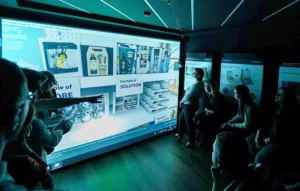What is ISTA?
ISTA (International Safe Transit Association) is an international safe transportation association, a non-profit organization that helps its members minimize product damage throughout the supply chain and optimize resource use by improving the efficiency of packaging solutions.
ISTA develops standards for packaging solutions to ensure the safe delivery of package contents and certifies laboratories to ensure that all facilities are properly equipped to perform pre-shipment testing of packaged products in accordance with ISTA standards.
What is an ISTA laboratory?
The ISTA laboratory is certified to perform pre-shipment testing using the required test equipment that has been properly installed and regularly maintained. This equipment must be operated by personnel capable of testing packaged products in accordance with ISTA® test designs and procedures, evaluating results, and completing and submitting test report forms at certified laboratories.
The ability to access ISTA laboratories is invaluable for companies whose supply chains suffer from packaging problems, as such laboratories help to minimize damage to products through rigorous packaging testing. The laboratory tests for many inherent hazards in the transportation process that many manufacturers may not be aware of, and those who do may not be able to perform the necessary tests themselves.
ISTA Test Types
In fact, there are a number of ISTA tests that vary depending on the level of certification you are applying for.
Series 1: Non-Simulation Integrity Performance Tests
Tests to evaluate the strength and reliability of the combination of product and packaging. Not designed to simulate environmental phenomena.
Series 2: Partial Simulation Performance Tests
Testing using at least one Series 3 test element (“Basic Simulation Performance Test”), such as atmospheric or random vibration simulation, in addition to the basic non-simulation integrity test elements from Series 1.
Series 3: Performance Tests with Basic Simulation
This series of tests is intended for laboratory simulation of the main damaging movements, forces, conditions and sequences of actions specific to transportation. The tests are applicable to a wide range of circumstances, including different types of vehicles and routes, as well as a different number of cargo handling stages. The impacts will include simple random vibrations, drops from various heights applied to packaging samples, and/or modeling of the effects of atmospheric conditions.
Series 4: Performance Tests with Enhanced Simulation
Basic simulation tests that include at least one purposeful simulation element, such as a sequence or test conditions associated with an actually known distribution.
Series 5: Recommendations for Purposeful Modeling
Recommendations for creating laboratory models based on actually measured and observed hazards in the field and their levels. Series 5 is not performance testing per se, but information and guidance related to creating user-defined tests based on targeted simulations.
Series 7. Tests at the development stage.
These tests are carried out at the stage of development of transport packaging. They can be used to compare the performance of two or more packaging options, but are not intended to evaluate the effectiveness of packaged product protection.
To understand which test options best suit your needs, check out the ISTA Test Selection Guide or contact one of our ISTA packaging testing experts using the form below.
What are the benefits of packaging testing according to ISTA standards?
One of the most important benefits of ISTA certification is the confidence it instills in customers: they know that the packaging has been rigorously tested to exacting standards and therefore will not damage their reputation. ISTA certification is often required by large retailers such as Amazon. In addition, it is a guarantee of minimizing damage from transportation and, accordingly, loss of products and customers.
Manufacturers get several benefits at once:
- Product protection
- Cost savings
- Increasing brand loyalty
- Increasing customer satisfaction
- Minimize the need for trial deliveries.






